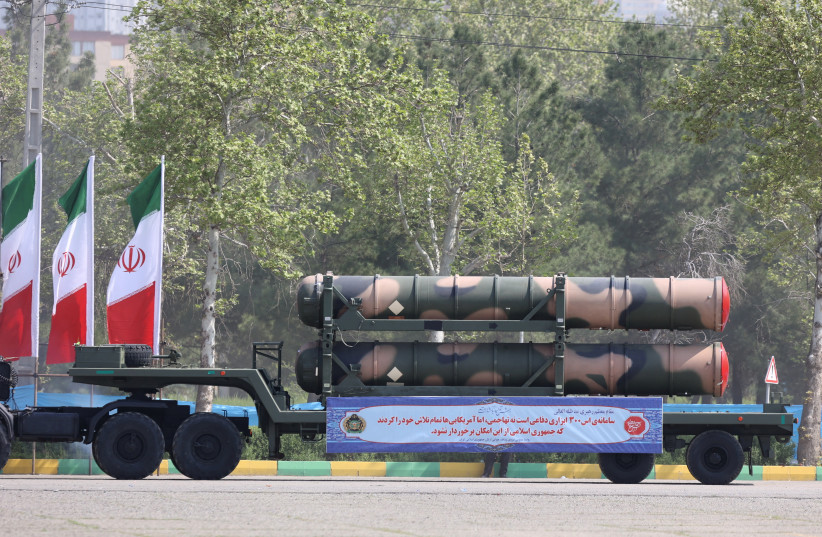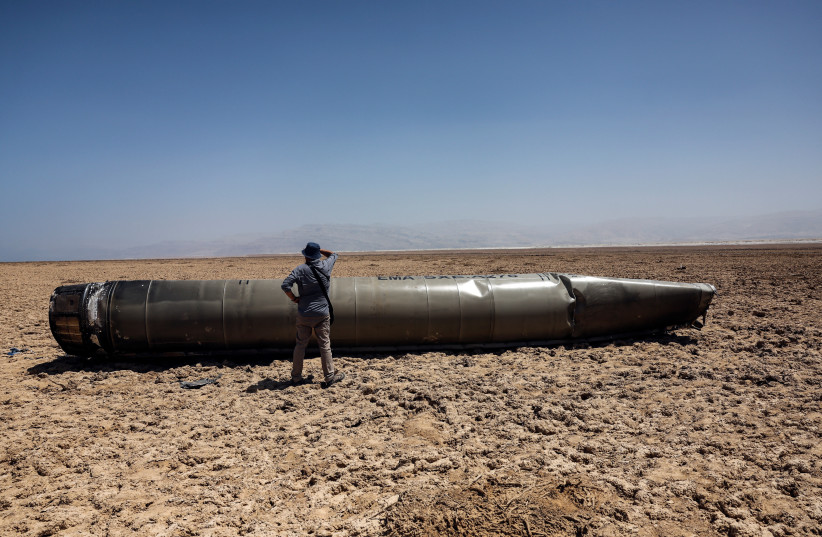Going in circles: Critics of Israel’s policy on Iran have dangerous logic – analysis
In the policy world, every now and then very sophisticated people make arguments which underneath rely on a foundation of blatantly circular logic.
The West’s critique of Israel’s policy to handle Iran – a policy which will need to be fundamentally reevaluated after Tehran’s massive April 14 attack – has recently run into this issue.
On one hand, many in the West have criticized Israel for assassinating Iran Islamic Revolutionary Guard Corps commander for Syria and Lebanon, Mohammed Reza Zahedi, on April 1.
Critics use logical fallacies
But at the same time, these same critics have urged Israel not to attack the Islamic Republic’s nuclear weapons program.
In the end, Israel heeded these critics somewhat, with Sports Minister Miri Regev confirming an Israeli attack on Iran’s S-300 anti aircraft missile system – a warning to Iran of the damage Israel could have done, but not actually doing any deep long-term damage.

It is far from clear that Israel’s limited action made it safe from future direct attacks from Iran.
In any case, those who slammed Jerusalem for removing Zahedi from the board said he was too high ranking and it destabilized the region.
They add that Israel itself was surprised that Tehran was furious enough at his death that it retaliated with around 350 aerial threats in its first-ever direct attack on the Jewish state.
This is brought as further proof that attacking him was overly aggressive.
Some of these same critics then urged Israel not to attack Iran back so as to avoid the conflict deteriorating into a regional war. Most importantly, to avoid regional war, they urged Israel not to touch Iran’s nuclear weapons program.
One way to summarize these critics’ advice to Israel is to sit back and wait for the ayatollahs and their proxies to do their worst against Jerusalem and to just always play defense.
Zahedi was not killed in a vacuum the way that much of the global media have reported it – as if the conflict between Israel and Iran started with his unprovoked death on April 1.
Rather, he has been directing a relentless terror campaign against Israel for years from both Syria and Lebanon.
Hezbollah in Lebanon have fired on Israel thousands of times with rockets and anti-tank missiles since October 7, and militias in Syria have likely fired on Israel hundreds of times.
But for around a decade before October 7, the IRGC, led by Qasem Soleimani or Zahedi, or both, was rallying Hezbollah and Syrian militias to attack Israel and to develop a huge threat buildup of rockets and militias on Israel’s borders to ready for an invasion or multi-front war, such as the current one.
Israel has been trying to hold Iran, its proxies, and Zahedi at bay with thousands of its own strikes on attempts by Tehran to smuggle more advanced weapons to the border with Israel, either from the Lebanese or Syrian side.
All of this is in the context that Israel has nothing against Iran at all if the ayatollahs ever just left the Jewish state alone.
This is no land disupute
There are no land disputes between the countries – they are around 1500 kilometers apart.
And if Iran simply stopped trying to threaten Israel, Jerusalem would not order strikes on anyone Iranian because it would not be the Jewish state’s business.
When Israel decided to kill Zahedi it was to send Iran a message that its years of pressing Hezbollah, Syria, and Hamas in Gaza to attack and wear down Israel, would not be free.
Hamas chose the date to invade Israel, but it could not have invaded the Jewish state without Iranian funding, planning, weapons, and training.
So Israel had plenty of reasons to want to remove Zahedi, and killing him was far from unprovoked.
When Israel decides in the future whether it would be willing to kill Zahedi’s successor to some other similarly very high ranking IRGC official, it will not need to weigh whether it is worth the risk.
But the risk it will be analyzing will not be in a vacuum, but by comparison.

Will Israel be more endangered by a backlash of another Iranian direct aerial attack to avenge the death of one of its top IRGC officials or will it be more endangered if it does nothing and allows the Islamic Republic to slowly attack it and surround it with more and more deadly weapons with impunity?
This is not a simple balancing act, but it is a balancing act which Israel will need to weigh, as opposed to the simplistic formula of some Western critics acting as if “restraint” by itself is a strategy that could keep Israel safe from Iran.
And how would those advising Israel not to strike Iran’s nuclear program have had it respond to the around 350 aerial attack threats which could have killed thousands of Israelis, and made Hamas’s October 7 massacre look like a warm-up? Iran’s attack also could have eliminated Israel’s F-35 squadrons which would have hampered Israeli national offensive and defensive power for the next decade.
Critics don’t want Israel to attack the nuclear program and they don’t want Israel to attack Iranian officials in Lebanon and Syria who are organizing terror campaigns against Jerusalem.
Do they really think that the Islamic Republic won’t fire missiles, rockets, and drones at Israel again because the Jewish state showed it was magnanimous?
How far will a US guarantee to defend Israel from future massive Iranian barrages go to deter Iran from attacking when the worst thing that could happen to Tehran is that its missiles will not get through and its “best” case scenario is killing thousands of Israelis.
Israel may have missed a unique opportunity to set back Iran’s nuclear program as part of a “retaliation” for Tehran’s massive attack.
But the US and the West pressed it not to, so it found a middle ground that did not draw blood and essentially let Iran off the hook without bloodying it too much.
From the US perspective, in the short term maybe it saved Israel from itself: from rushing into an unnecessary intensified regional war.
But Israel needs to live in this region long after the US loses focus or interest and will eventually need to recalibrate how it can both prevent Iran’s proxies from raining down a “ring of fire” on it as well as prevent Tehran from breaking out to a nuclear weapon which could endanger Israel on an existential level.
Balancing the risks for retaliating is necessary, but constant restraint as a complete strategy for dealing with a hardened adversary like Iran would eventually be more dangerous than acting.





Comments are closed.